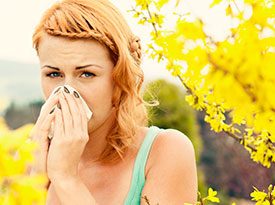Allergies: How to fight back (and win) this season
Sneezing season has arrived. Don’t let it ruin your life.

Source: Best Health Magazine, March/April 2015
Do you come down with a sneezy, sniffly "cold" as soon as the weather warms up in April?
Maybe you last until June before itchy, watery eyes make an appearance, or perhaps you make it all the way to the dog days of August before being sidelined by sinus headaches.
Regardless of when they hit, these symptom patterns point to the same culprit: seasonal allergies. Triggered by pollens or mould, they affect up to one in four Canadians.
Also known as seasonal allergic rhinitis or hay fever, seasonal allergies are nothing to sneeze at ‘ the symptoms can play havoc with your sleep, mood and even productivity.
The good news? There are treatments that can short-circuit allergic reactions and prevent those miserable symptoms. "You shouldn’t blow them off, as ‘just allergies,’" says Jeff Taylor, a professor of pharmacy at the University of Saskatchewan in Saskatoon. "I wish people would push to get some help because suffering needlessly is unfortunate."
First things first
So, let’s say you have a hunch you suffer from seasonal allergies. Can you self-diagnose? "It’s actually really hard to do that accurately," says Dr. Anne Ellis, associate professor of medicine and chair of the division of allergy and immunology at Queen’s University in Kingston, ON. While the timing of symptoms strongly hints at specific allergens ‘ for instance, depending on where you live, tree pollen counts tend to peak in April and May, while ragweed season lasts from August to October ‘ allergy testing is the only way to tell for certain.
"You’d be surprised at how often I see patients with what sound like classical histories for a particular seasonal allergen and, when tested, they’re only allergic to, for example, dust mites," she explains. That’s important, since avoiding the substance that triggers your allergies is one of the best ways to reduce symptoms and minimize the need for medications. (You can find info on minimizing your exposure to mould, pollen and dust mites at asthma.ca.)
Managing symptoms
That said, unless your symptoms are especially severe, trying an over-the-counter allergy treatment is a reasonable first step. "I’d think about trying one of the non-sedating antihistamines," such as Reactin, Allegra or Claritin, says Taylor. These medications, which are quite safe, work by blocking histamine, one of the substances that drive allergy symptoms.
Taylor suggests choosing one product and using a time frame of two to three weeks to try an agent to see if it helps. Take it every day (as long as there is allergen exposure) since the drugs tend to work better when taken regularly. (It’s worth asking your pharmacist for guidance if you take other medications or have a chronic health condition, like high blood pressure or thyroid problems.) "Sometimes people respond differently to different medications," adds Taylor, so if one fails to relieve your symptoms, you might want to try a second, two-week trial with another.
The nose knows
Pills not your thing? There is a natural treatment that’s been shown to be effective for relieving nasal stuffiness caused by seasonal allergies: using an over-the-counter saltwater rinse or spray to swish out the snot, along with lingering allergens and symptom-causing inflammatory cells.
"Just the moisturizing effect produces a soothing sense of relief," notes Dr. Ellis, adding that when she washes out patients’ sinuses to obtain cell samples for research, "they’re amazed at how much better they feel." What’s more, "Saline rinses are so safe that you can use them up to six times a day if you can find the time."
You can even make your own saltwater solution at home. Just ensure that the water has been thoroughly boiled to eliminate the risk of a (rare) brain infection caused by an amoeba that is sometimes found in tap water. For a good recipe, go to aaaai.org and search for "saline rinse."
Peeper relief
For itchy, watery eyes, over-the-counter allergy drops, like Visine Allergy or Optichrom, may be worth a try. These products typically contain either an antihistamine or a medication that prevents certain immune cells from unleashing symptom-causing chemicals. It’s worth noting, though, that unlike their prescription counterparts, over-the-counter drops often contain a decongestant to help manage redness that, if used for long periods, may cause "rebound redness" when discontinued. If you’re concerned about this, speak to your healthcare practitioner for a prescription medication.
What’s next?
If over-the-counter options don’t control your symptoms, "You should definitely see a physician," says Dr. Ellis, "because there are treatments that can provide better relief." These include under-the-tongue tablets that, like allergy shots, gradually teach your immune system to tolerate increasing doses of a particular allergen (such as grass pollen) without hitting the panic button. "These treatments modify the disease rather than just control symptoms in a safer and more accessible formulation than injectable allergy shots," says Dr. Ellis.




